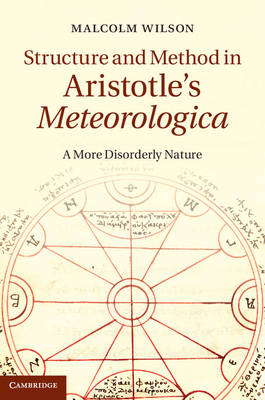
Structure and Method in Aristotle's Meteorologica
A More Disorderly Nature
Seiten
2013
Cambridge University Press (Verlag)
978-1-107-04257-5 (ISBN)
Cambridge University Press (Verlag)
978-1-107-04257-5 (ISBN)
In the first full-length study in English of the Meteorologica, Malcolm Wilson presents a groundbreaking interpretation of Aristotle's natural philosophy by integrating weather phenomena between the universal cosmos as a whole and the microcosmic animals on the earth. The book also provides an invaluable section-by-section analysis of the text.
In the first full-length study in any modern language dedicated to the Meteorologica, Malcolm Wilson presents a groundbreaking interpretation of Aristotle's natural philosophy. Divided into two parts, the book first addresses general philosophical and scientific issues by placing the treatise in a diachronic frame comprising Aristotle's predecessors and in a synchronic frame comprising his other physical works. It argues that Aristotle thought of meteorological phenomena as intermediary or 'dualizing' between the cosmos as a whole and the manifold world of terrestrial animals. Engaging with the best current literature on Aristotle's theories of science and metaphysics, Wilson focuses on issues of aetiology, teleology and the structure and unity of science. The second half of the book illustrates Aristotle's principal concerns in a section-by-section treatment of the meteorological phenomena and provides solutions to many of the problems that have been raised since the time of the ancient commentators.
In the first full-length study in any modern language dedicated to the Meteorologica, Malcolm Wilson presents a groundbreaking interpretation of Aristotle's natural philosophy. Divided into two parts, the book first addresses general philosophical and scientific issues by placing the treatise in a diachronic frame comprising Aristotle's predecessors and in a synchronic frame comprising his other physical works. It argues that Aristotle thought of meteorological phenomena as intermediary or 'dualizing' between the cosmos as a whole and the manifold world of terrestrial animals. Engaging with the best current literature on Aristotle's theories of science and metaphysics, Wilson focuses on issues of aetiology, teleology and the structure and unity of science. The second half of the book illustrates Aristotle's principal concerns in a section-by-section treatment of the meteorological phenomena and provides solutions to many of the problems that have been raised since the time of the ancient commentators.
Malcolm Wilson is Associate Professor of Classics at the University of Oregon. He is author of Aristotle's Theory of the Unity of Science (2000) and numerous articles on ancient philosophy and science.
Introduction; 1. The rebirth of meteorology; 2. From elements to exhalations; 3. The exhalations; 4. The biological method; 5. Teleology in the Meteorologica; 6. Kapnosphere; 7. Condensation and precipitation (1.9-12); 8. Fresh waters (1.13-14); 9. The sea (2.1-3); 10. Winds (2.4-6); 11. Earthquakes and stormy phenomena (2.7-3.1); 12. Reflections (3.2-6); 13. Minerals and metals.
| Zusatzinfo | 12 Line drawings, unspecified |
|---|---|
| Verlagsort | Cambridge |
| Sprache | englisch |
| Maße | 158 x 235 mm |
| Gewicht | 580 g |
| Themenwelt | Geschichte ► Allgemeine Geschichte ► Vor- und Frühgeschichte |
| Geschichte ► Allgemeine Geschichte ► Altertum / Antike | |
| Geisteswissenschaften ► Philosophie ► Philosophie Altertum / Antike | |
| ISBN-10 | 1-107-04257-7 / 1107042577 |
| ISBN-13 | 978-1-107-04257-5 / 9781107042575 |
| Zustand | Neuware |
| Haben Sie eine Frage zum Produkt? |
Mehr entdecken
aus dem Bereich
aus dem Bereich
auf den Spuren der frühen Zivilisationen
Buch | Hardcover (2023)
C.H.Beck (Verlag)
20,00 €
Konzepte – Methoden – Theorien
Buch | Softcover (2024)
UTB (Verlag)
39,90 €
Was Pompeji über uns erzählt
Buch | Hardcover (2023)
Propyläen (Verlag)
32,00 €


